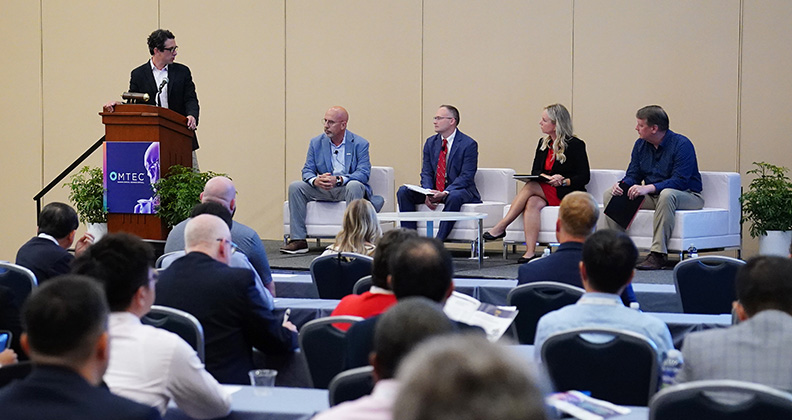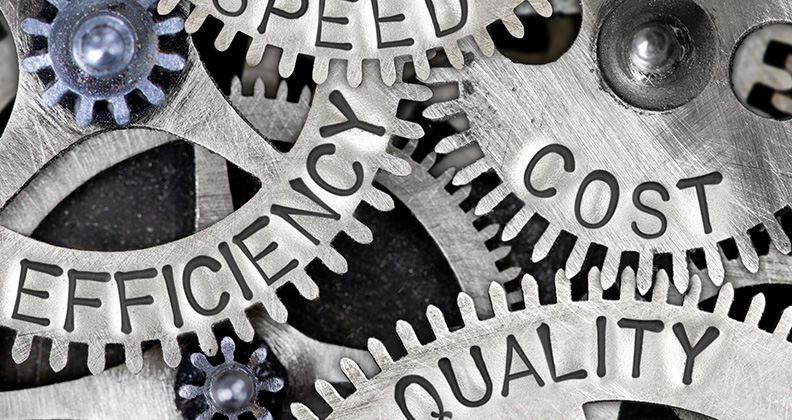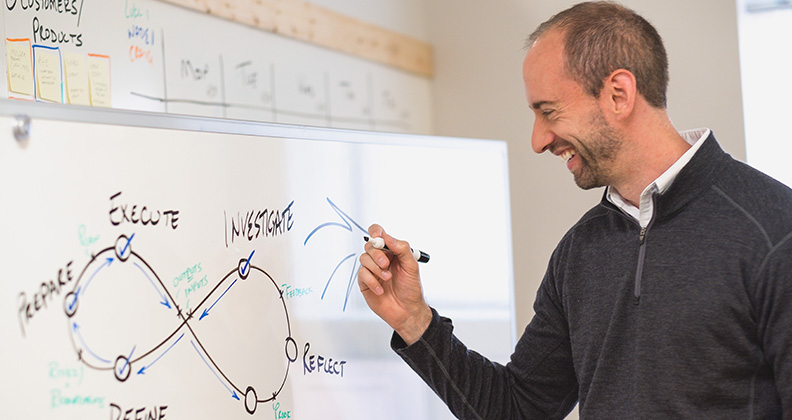
Distracted is a word I hear used a lot these days.
Maybe you’re working remotely and distracted by your physical space or the people with whom you share that space. Maybe directives on a big project changed and caused a distraction to daily processes. COVID-19 brought new levels of unease, uncertainty and unpredictability to personal and professional life this year.
Our world is changing. Yet, we need to find ways to remain focused and productive.
Earlier this year, I read Cal Newport’s “Deep Work: Rules for Focused Success in a Distracted World.” Newport defines deep work as the ability to focus without distraction on a cognitively demanding task. Deep work creates new value, improves skills and is hard to replicate. In contrast, shallow work is often performed with distraction and creates little new value and is easy to replicate.
Focusing sounds easy enough, right? Well, there’s a reason Newport and dozens of others have made livings advising us on ways to concentrate.
Newport argues that society, businesses and our own brains are structured to prioritize shallow work. A prime example is our culture of connectivity and the fulfillment from monitoring emails or messages at all hours of the day, along with our complimentary nature toward multitaskers.
Successful people are not successful because they’ve mastered multitasking. Newport argues it’s the opposite. Successful people train their brains to filter out distractions to focus on a singular, meaningful, important or complex task.
In everyday terms, deep work is a state of mind that can strengthen a skill set, finish an internal report or strategize how to implement an improvement process.
Ridding yourself of distraction to meaningfully focus on your work takes discipline and time. The result, though, enables more profound, more holistic quality of thought and less time investment overall. A few of Newport’s lessons could be useful in managing your behavior to a less distracted state.
Find the Strategy that Works for You
Multiple strategies can be employed to accomplish deep work. You need to determine which approach works best for you.
If you have a fixed schedule where you can more or less predict how your days will unfold, the rhythmic philosophy is the ideal deep work schedule. This allows you to block your calendar for periods of deep work, essentially allowing you to get into a mental rhythm for concentration. The rhythmic philosophy best suits how humans are wired to work, Newton said.
The journalist philosophy is an approach for those with less regularity to their days and sporadic moments for concentration. This method recommends short stints—30 minutes to two hours—of deep work whenever you can fit it into your schedule. The difficulty with this philosophy is that it requires the discipline to quickly jump into a deep state of thought when the time allows.
Success with either philosophy requires rituals, Newport said. Practices could be location, time of day, length of time and support mechanisms like turning off emails and messaging apps or silencing your phone. The tradition allows you to build stamina and willpower to maintain your state of deep work.
“You have a finite amount of willpower that becomes depleted as you use it,” Newton said. “Your will, in other words, is not a manifestation of your character that you can deploy without limits. It’s instead like a muscle that tires.”
Deep Work Requires Discipline
Saying is one thing; doing is another. Newport noted that people often know what to do to achieve a goal, but they struggle to do it. Deep work execution is no different. But there are a few disciplines you can follow to achieve depth in your concentration and reach important goals.
First, focus on what’s “wildly important,” Newton said. Deep work should be reserved for your most important goals. By keeping your biggest objectives top of mind, you can more easily fend off the distractions that don’t serve your long-term interests or goals. To assist with this discipline, write down your priorities and keep the list in front of you.
Further, track your progress. Count the number of hours that you spend in deep work mode. Measuring your time allows you to score your progress and could motivate you to increase the number of hours spent in the upcoming days or weeks, Newton said.
Finally, create an accountability measure to remain disciplined. Commit to a daily or weekly deep work goal and then take the time to review your progress and assess whether you’re falling short or you should push yourself further.
Deep work is not about constraint; it’s about thoughtfulness, Newton said. It’s about forming habits and structures that lead to greater focus and, ultimately, a deeper level of thought. These disciplines were built as reminders to stay focused on what’s essential and track your continued improvement.
The goal Newton said is, “Don’t take breaks from distraction. Take breaks from focus.”
Deep Work in Doses
Not all work requires deep work. In fact, Newton found that after four hours of deep work, you reach the point of diminishing return for productivity.
You can pursue other behaviors to assist in practicing distraction-free work. Additional routines or rituals include unplug from work at night and resist looking at email, quit social media and learn to say no more often. Believe me, I realize that these are much harder in action and, for some people, just aren’t achievable. Newton used the rationale that anything added to your life takes away from other elements. Mental fortitude is gained by giving your mind a break from constant inputs.
One thing Newton stressed, and I’ve learned, is that deep work cannot be mastered overnight. I finished Newton’s books in April when I was waking early to work in quietness while a husband, small human and cat slept. After a few months of practice, and even the return of some normalcy in my schedule, shallow work habits creep up all the time.
Newport’s view on deep work is that it’s a years-long journey. And while, yes, it’s a philosophy focused on improving quality of thought by decreasing distractions, at its core, it’s a method to become a better version of yourself.
Simply, he said, “The ability to concentrate is a skill that gets valuable things done.”
CL
Carolyn LaWell is ORTHOWORLD's Chief Content Officer. She joined ORTHOWORLD in 2012 to oversee its editorial and industry education. She previously served in editor roles at B2B magazines and newspapers.




